Learners Guide International
Are you striving for academic excellence and top grades? Look no further! At Learners Guide International we provide premium study materials purposely crafted to help you excel in your exams and achieve your academic goals.
- 64
- 0
- 3
Community
- Followers
- Following
67 items
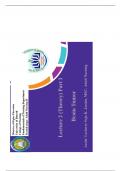
Brain Tumor and head injury
Q1// The nurse is performing a neurologic assessment of a patient whose injuries have rendered her unable to follow verbal commands. How should the nurse proceed with assessing the patients level of consciousness (LOC)? • A) Assess the patients vital signs and correlate these with the patients baselines. • B) Assess the patients eye opening and response to stimuli. • C) Document that the patient currently lacks a level of consciousness • D) Facilitate diagnostic testing in an eff...
- Exam (elaborations)
- • 13 pages •
Q1// The nurse is performing a neurologic assessment of a patient whose injuries have rendered her unable to follow verbal commands. How should the nurse proceed with assessing the patients level of consciousness (LOC)? • A) Assess the patients vital signs and correlate these with the patients baselines. • B) Assess the patients eye opening and response to stimuli. • C) Document that the patient currently lacks a level of consciousness • D) Facilitate diagnostic testing in an eff...
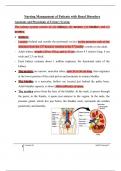
Nursing Management of Patients with Renal Disorders
Nursing Management of Patients with Renal Disorders Anatomic and Physiologic of Urinary System: The urinary system consist of (2) kidneys, (2) ureters, (1) bladder, and (1) urethra. Kidneys: - Located (behind and outside the peritoneal cavity) on the posterior wall of the abdomen from the 12th thoracic vertebra to the 3rd lumbar vertebra in the adult. - Adult kidney weighs 120 to 170 g, and is 12 cm (about 4.5 inches) long, 6 cm wide and 2.5 cm thick. - Each kidney contains about 1 mil...
- Summary
- • 13 pages •
Nursing Management of Patients with Renal Disorders Anatomic and Physiologic of Urinary System: The urinary system consist of (2) kidneys, (2) ureters, (1) bladder, and (1) urethra. Kidneys: - Located (behind and outside the peritoneal cavity) on the posterior wall of the abdomen from the 12th thoracic vertebra to the 3rd lumbar vertebra in the adult. - Adult kidney weighs 120 to 170 g, and is 12 cm (about 4.5 inches) long, 6 cm wide and 2.5 cm thick. - Each kidney contains about 1 mil...
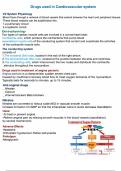
Drugs Administration and Routines
Absorption and Drug Action • The function of the gastrointestinal tract is different in very young and the elderly. • Infants and the very elderly tend to be the most sensitive to the effects of the drugs. • Common problem is the slowed peristalsis and the gastric emptying time. • Activity and concentrations of digestive secretions are lower in new
- Package deal
- • 4 items •
- Drugs used in Cardiovascular system • Summary
- Drugs Acting on the Respiratory System • Summary
- ROUTES OF DRUG ADMINISTRATION • Summary
- Drugs Affecting the Autonomic Nervous System • Summary
Absorption and Drug Action • The function of the gastrointestinal tract is different in very young and the elderly. • Infants and the very elderly tend to be the most sensitive to the effects of the drugs. • Common problem is the slowed peristalsis and the gastric emptying time. • Activity and concentrations of digestive secretions are lower in new
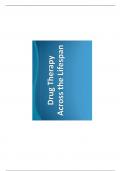
Drugs Therapy across the Lifespan
Absorption and Drug Action • The function of the gastrointestinal tract is different in very young and the elderly. • Infants and the very elderly tend to be the most sensitive to the effects of the drugs. • Common problem is the slowed peristalsis and the gastric emptying time. • Activity and concentrations of digestive secretions are lower in newborns. • Infants and elderly require special considerations for medication administration. An example can be: absorption of medic...
- Summary
- • 38 pages •
Absorption and Drug Action • The function of the gastrointestinal tract is different in very young and the elderly. • Infants and the very elderly tend to be the most sensitive to the effects of the drugs. • Common problem is the slowed peristalsis and the gastric emptying time. • Activity and concentrations of digestive secretions are lower in newborns. • Infants and elderly require special considerations for medication administration. An example can be: absorption of medic...
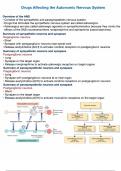
Drugs Affecting the Autonomic Nervous System
Drugs Affecting the Autonomic Nervous System Overview of the ANS • Consists of the sympathetic and parasympathetic nervous system. • Drugs that stimulate the sympathetic nervous system are called adrenergics. • Adrenergics are also called adrenergic agonists or sympathomimetics because they mimic the effects of the SNS neurotransmitters norepinephrine and epinephrine (catecholamines). Summary of sympathetic neurons and synapses Preganglionic neurons • Short • Synapse with post...
- Package deal
- Summary
- • 4 pages •
Drugs Affecting the Autonomic Nervous System Overview of the ANS • Consists of the sympathetic and parasympathetic nervous system. • Drugs that stimulate the sympathetic nervous system are called adrenergics. • Adrenergics are also called adrenergic agonists or sympathomimetics because they mimic the effects of the SNS neurotransmitters norepinephrine and epinephrine (catecholamines). Summary of sympathetic neurons and synapses Preganglionic neurons • Short • Synapse with post...
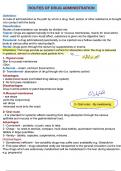
ROUTES OF DRUG ADMINISTRATION
Definition: A route of administration is the path by which a drug, fluid, poison or other substance is brought into contact with the body Classification Routes of administration can broadly be divided into: Topical: Drugs are applied topically to the skin or mucous membranes, mainly for local action. Oral: used for systemic (non-local) effect, substance is given via the digestive tract. Parenteral: A drug administered parenterally is one injected via a hollow needle into the body at vari...
- Package deal
- Summary
- • 4 pages •
Definition: A route of administration is the path by which a drug, fluid, poison or other substance is brought into contact with the body Classification Routes of administration can broadly be divided into: Topical: Drugs are applied topically to the skin or mucous membranes, mainly for local action. Oral: used for systemic (non-local) effect, substance is given via the digestive tract. Parenteral: A drug administered parenterally is one injected via a hollow needle into the body at vari...
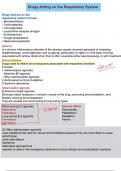
Drugs Acting on the Respiratory System
Drugs Acting on the Respiratory System Drugs that act on the respiratory system include • Bronchodilators • Corticosteroids • Cromoglycates • Leukotriene receptor antagon • Antihistamines • Cough preparations • Nasal decongestants Asthma is a chronic inflammatory disorder of the airways causes recurrent episodes of wheezing, breathlessness, chest tightness, and coughing, particularly at night or in the early morning associated with airflow obstruction that is often rev...
- Package deal
- Summary
- • 6 pages •
Drugs Acting on the Respiratory System Drugs that act on the respiratory system include • Bronchodilators • Corticosteroids • Cromoglycates • Leukotriene receptor antagon • Antihistamines • Cough preparations • Nasal decongestants Asthma is a chronic inflammatory disorder of the airways causes recurrent episodes of wheezing, breathlessness, chest tightness, and coughing, particularly at night or in the early morning associated with airflow obstruction that is often rev...

Drugs used in Cardiovascular system
Drugs used in Cardiovascular system CV System Physiology Blood flows through a network of blood vessels that extend between the heart and peripheral tissues. These blood vessels can be subdivided into 1.a pulmonary circuit 2.a systemic circuit Electrophysiology Two types of cardiac muscle cells are involved in a normal heart beat: •contractile cells, which produce the contractions that pump blood •specialized muscle cells of the conducting system that control and coordinate the acti...
- Package deal
- Summary
- • 5 pages •
Drugs used in Cardiovascular system CV System Physiology Blood flows through a network of blood vessels that extend between the heart and peripheral tissues. These blood vessels can be subdivided into 1.a pulmonary circuit 2.a systemic circuit Electrophysiology Two types of cardiac muscle cells are involved in a normal heart beat: •contractile cells, which produce the contractions that pump blood •specialized muscle cells of the conducting system that control and coordinate the acti...
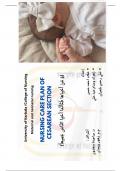
NURSING CARE PLAN OF CESAREAN SECTION
introdation of Cesarean birth introdation of Cesarean birth introdation of Cesarean birth introdation of Cesarean birth introdation of Cesarean birth introdation of Cesarean birth introdation of Cesarean birth introdation of Cesarean birth classification of C/S classification of C/S classification of C/S classification of C/S classification of C/S classification of C/S classification of C/S classification of C/S classification of C/S classification of C/S classification of C/S classification of ...
- Summary
- • 21 pages •
introdation of Cesarean birth introdation of Cesarean birth introdation of Cesarean birth introdation of Cesarean birth introdation of Cesarean birth introdation of Cesarean birth introdation of Cesarean birth introdation of Cesarean birth classification of C/S classification of C/S classification of C/S classification of C/S classification of C/S classification of C/S classification of C/S classification of C/S classification of C/S classification of C/S classification of C/S classification of ...
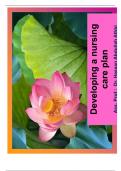
Developing a Nursing Care Plan
What is Nursing Process: A process: is a series of steps or acts that lead to accomplishment of some goals or purpose. Nursing process: is a problem solving approach to meeting the health care and patient ´s needs. Its purpose is to: 1. Identify, prevent, and treat actual or potential health problems or need and promote wellness. 2. Establish plans to meet patient ´s needs. 3. Provide individualized, holistic, effective client care efficiently to meet those needs. Phases of t...
- Summary
- • 75 pages •
What is Nursing Process: A process: is a series of steps or acts that lead to accomplishment of some goals or purpose. Nursing process: is a problem solving approach to meeting the health care and patient ´s needs. Its purpose is to: 1. Identify, prevent, and treat actual or potential health problems or need and promote wellness. 2. Establish plans to meet patient ´s needs. 3. Provide individualized, holistic, effective client care efficiently to meet those needs. Phases of t...
